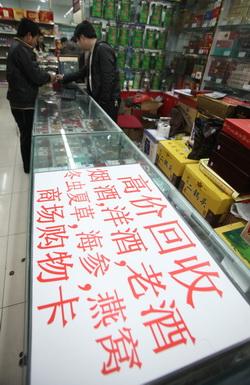
Reselling presents a thriving business after holiday
Retail stores and online businesses are pulling in huge profits through purchases of gifts of tobacco and alcohol - passed between families and friends over the recent Spring Festival - at low prices and reselling them on as new.
More than 10 resellers contacted by METRO said they could earn between 10,000 and 30,000 yuan ($1,465 - 4,395) in the month following Spring Festival, the traditional Chinese Lunar New Year's holiday.
Although there is no concrete data available on the number of businesses, a Baidu search in Chinese of "retrieving gifts in Beijing" revealed a total of 2,450,000 related pages.
A business owner surnamed Wang, in charge of a retail store in Fengtai district, told METRO his business profit would shrink this year because of the industry's rising popularity.
"I earned about 40,000 yuan over that period in 2008, but I think I'll make less than half that this year," he said.
He revealed that his business included waiting at stores for sellers to trade, and journeying to community areas to appeal directly to locals.
"Our regular customers usually invite us to their homes to pick up the goods. I remember once buying almost 3,000 yuan of famous tobacco from just one customer," he said.
A 25-year-old employee surnamed Xue, who works for a reselling store in Chaoyang district, said he usually makes his biggest deals from government officials and company executives.
"Some sellers are powerful people in high positions. They usually receive gifts from those who want to get closer to them," he said.
In addition to tobacco and wine, Chinese herbal and medical materials such as "winter worm summer herb", packed in delicate gift boxes, are also an industry favorite.
Despite the outward prosperity, tobacco laws are not so favorable.
A press officer with Beijing Administration for Industry and Commerce said reselling stores do not have permission to operate their business.
"But since most are operating in secret ways, it is very difficult to investigate or supervise them," he said.
Jian Qinglin, a lawyer with Beijing Bailun Law Firm, said because the transactions don't strictly involve legal companies and customers, all trade is unprotected by law and fraud could be a problem.





